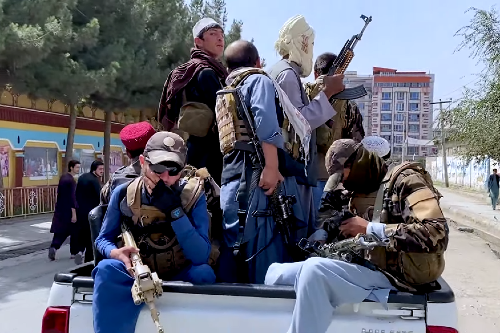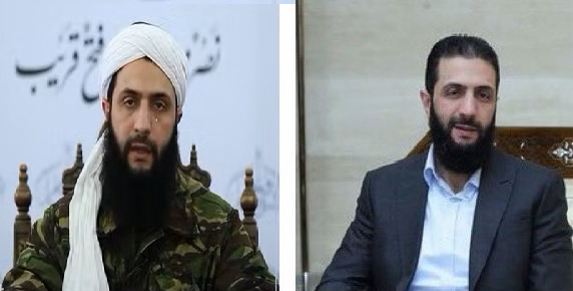Human Rights or Politics? The Initiative Against Taliban's Oppression of Women

Share
Earlier, we covered the use by states of human rights advocacy as a political tool in the realm of international affairs, and the effects of this behavior on the international human rights legal framework, when not balanced with genuine focus on the protections of the rights themselves.
To this point, on the sidelines of the United Nations General Assembly held in September, the ministers of foreign affairs of Australia, Canada, Germany and the Netherlands announced an initiative to hold the Taliban accountable for Afghanistan’s violations of the provisions of the Convention on the Elimination of All Forms of Discrimination Against Women (CEDAW). They, along with a group of 22 other countries, condemned in their joint statement the violations of human rights, and particularly gender-based discrimination against women. Afghanistan has been a state party to CEDAW since 2003, having acceded under the previous government.
Vociferously condemning the progressive encroachment on women's and girls' rights since the Taliban took power in late 2021, these four states reaffirmed their commitment to protecting women’s rights in Afghanistan, and under the provisions of CEDAW have taken steps to invoke arbitration within six months, to be potentially followed by a referral to the International Court of Justice (ICJ).
The Return of Taliban & The Progressive Regression of Women’s Rights in Afghanistan

Taliban first rose to power in the early to mid-1990s during the second Afghan civil war. After they took Kabul in 1996, they retained control of most of Afghanistan’s territory until 2001 when they were defeated by the US led coalition in response to the September 11 attacks. Taliban went underground as a new Afghani government took power, but remained active and committed to their ideological background, and they regained control of Afghanistan in late 2021 when US forces withdrew from Afghanistan, leading to the almost immediate collapse of the Afghani government in place at the time.
Taliban’s ideological foundations are rooted in a hybrid form of fundamentalist Islam inspired by the more extremist ends of the Islamist political spectrum meshed with local Pashtun tribal traditions. The ideology crosses the threshold of misogyny, banning women from public spaces from education, and limits their independence and agency in almost every aspect of life.
When they regained power in late 2021, the Taliban had initially maintained that they would have a softer approach to women than their previous iteration in running Afghanistan in the late 1990s. However, this position shifted over time, reverting to the hard line positions the Taliban have become (in)famous for. Today, women in Afghanistan have all but disappeared from public life and have extreme restrictions imposed on them at every turn.
Since regaining control of Afghanistan, the Taliban have attempted to cultivate broader international relations, and while they have established some de facto diplomatic relations with a number of countries, they are not officially recognized by any government around the world as the legitimate government of Afghanistan.
The Initiative: Leveraging CEDAW Against Taliban

In September 2024, during the high level week of the 79th round of the UN General Assembly, Australia, Canada, Germany, and the Netherlands took an initiative to hold the Taliban -as the de facto government of Afghanistan- accountable for violating women’s rights under CEDAW. A joint statement supported by 22 countries in addition to the original four condemned the violations of women’s rights, and called upon theTaliban to comply with international human rights law.
The stated motive, the protection of women’s rights in Afghanistan, is noble; the womem of Afghanistan have endured extensive violations of their rights under the rule of the Taliban, and deserve the protections afforded to women and girls undr CEDAW.
Howevere, the Taliban will not, of their own accord, take any steps to alleviate this suffering. As an integral part of their ideology, the oppression of women under the guise of religion and tribal law is central to their belief system and for the maintenance of their support base across various tribal regions in Afghanistan; exhibiting flexibility on this matter has little ideological or practical purpose for the Taliban.
CEDAW entered into force in September 1981, codifying the principles of equity and equality between men and women, and geared toward achieving gender equality and protection for women from discrimination across the world. It calls for incorporating within national legislation legal measures to prevent discrimination against women, and to modify social and cultural patterns of conduct to eliminate gender based social prejudices, and includes within its provisions the fields and scope of applicability.
The convention provides mechanisms for enforcement under its 29th article -alluded to by the four initiating states- which states that there is an escalating framework of steps when engaging a state party regarding its violations of the terms of the agreement. They begin with arbitration and can escalate to referring the offender -if arbitration fails- to the ICJ. Given that Afghanistan did not opt out of the mechanisms of arbitration of the convention, the legal processes can theoretically apply to it.
Therefore, for all intents and purposes, the initiative and the tool employed are following the proper international protocol for pursuing the matter within the international legal framework.
Impact of the Initiative

Despite the nobility of the sentiment, and the relevance of the steps enacted, the initiative itself seems to be lacking in momentum. Of the 189 state parties to CEDAW, only 22 supported the initiative by the four countries, constituting less than twelve percent of the parties.
Of the 26 countries in the joint declaration, 19 are European -in addition to Canada and Australia- , two are African, and one each from Latin America, the Caribbean, and Asia. Of these, only one supporting country is a Muslim majority country and only one is sub-Saharan.
None of the countries involved appear to have significant relations with Afghanistan, which precludes significant leverage with the de facto Taliban authorities that could entice them to engage with suggestions on enacting protections for women’s rights within their operating governance structures.
Through the statement, supporting governments hold the Taliban responsible to fulfil the international legal obligations of Afghanistan, while emphasizing that they do not recognize them politically. The statement further alludes to the violations of women’s rights as a hurdle to normalizing relations, without hinting at any positive step regarding recognition that would arise from addressing the issue on the part of Taliban.
It is therefore a statement rife with sticks as opposed to carrots, featuring condemnation of the Taliban and their violations of women’s rights, threatening legal actions and demanding adherence to international law and the recommendations of the Human Rights Council Periodic Review earlier this year-which the Taliban was not a part of.
The trouble with leveraging sticks without carrots in this case is that they pose no threat to Taliban. Even if there were broader support for the action, the actions contained within it hold little potential to harm the regime. Already isolated, unrecognized and largely immune to international pressure, Taliban have little if any motivation to succumb to the demands contained in the statement.
The statement does not invite dialogue or discussion, despite its calls for the Taliban to answer to the request for dialogue to address the concerns of the international community that it contains. The framing of this request makes it quite clear that it will be in the form of a lecture rather than a dialogue, and that rather than a two way communication it will be a one sided dictation of what Taliban needs to do. The lack of any points of attraction within the statement make it less likely that Taliban would engage with its supporters.
Furthermore, the Taliban does not admit that their actions against women and girls are prejudicial. They state that they are implementing Islamic law, and that they are not violating women’s rights but rather safeguarding them in the context of Islamic sharia. Therefore, the launching point of the conversation is divergent between the parties from the get go; on the one hand there is reference to CEDAW as the primary source protections of the rights of women and girls, and on the other is the interpretation of Sharia by Taliban. Without finding a common starting point for dialogue, this initiative risks failure from the outset.
Political Considerations
While the motives of the initiative, the protection of women’s rights in Afghanistan, is a noble one and worthy of respect, questions are being asked regarding the motivations of the four countries leading the initiative. As we discussed in the piece on leveraging human rights as a political tool, governments’ concerns for human rights are seldom motivated by the principles themselves, but are rather wielded as a tool for political pressure, engagement or an opportunity to position themselves in a particular light on the international stage.
In this case, the four states leading the initiative -Australia, Canada, Germany and the Netherlands could be viewed by other actors as being inconsistent in their positions on human rights and the implementation of international law, mainly as a result of their positions on the Israel Palestine conflict. All four governments abstained on the UN General Assembly Resolution on the Advisory Opinion of the International Court of Justice the legal consequences arising from Israel's policies and practices in the Occupied Palestinian Territory.
Their abstentions in this instance, and despite the ongoing widespread violations of both international human rights law and international humanitarian law, and particularly in the presence of an advisory opinion by the ICJ, reduce the power of their statements expressing the importance of adherence to international law and the necessity of protecting human rights elsewhere. Their positions here could elicit a response of whataboutism; the question “what about the violations perpetrated by Israel” hovers around their statements as they demand that Taliban adhere to international law.
Further compounding this issue is the limited current support for the initiative, and the lack of geographical representation within it. There could be any number of reasons at this early stage, including that the countries did not have enough time to mobilize sufficient support during the high level week, and will redouble their efforts over the course of the coming six months leading up to the deadline of the arbitration.
It could also be a matter of timing. With the escalating crisis in the middle east, and the magnitude of civilian deaths and ongoing violations of international law, prioritizing the issue of women’s rights in Afghanistan over the issue of addressing the tens of thousands of civilians killed could be politically ill advised for certain governments.
Exacerbating the issue of supporting the protection of women’s rights in Afghanistan as opposed to addressing the ongoing violations in the Middle East could be a contributing factor to the relatively low support at this stage. For some governments, voicing support for an initiative on human rights led by countries that did not support the protection of human rights against Israeli violations in the middle east could prove politically difficult to justify.
As it stands, the political context in which this initiative was launched is not necessarily the ideal one to generate momentum and support for it. Furthermore, the framing of its language does not offer the addressed party -de facto Taliban government- a window for conversation; it is framed as a dictation of terms that need to be accepted rather than an opportunity for engagement to explore mechanisms to gradually alleviate the suffering of Afghan women.
Therefore, the initiative, led by countries that have limited leverage over the Taliban, with temporarily reduced credibility on the issue of human rights among the Global South, and adopting a confrontational rather than dialogue tone, may not see extensive support without some adjustments to the initiative.
Adjustments for Effectiveness
There are a number of key steps that can enhance the initiative and make it more impactful on the global stage. First and foremost, a shift in leadership of the initiative at this stage could help generate support and momentum for it. Rather than the current four states spearheading the effort, other countries would be more effective in generating support. For instance, from among the countries currently supporting the initiative, having Ireland, Spain, and Slovenia (and to a lesser degree Belgium) replacing the current quartet could help generate support among the Global South, as they have comparatively more credibility in the current political context given that their positions on global human rights issues are more consistent across the board.
The current lack of geographic representation supporting the initiative weakens its impact; for it to be effective, it needs cross regional support from various key areas. Among the key regions where support for the resolution would be impactful are the Middle East and Central Asia, particularly Uzbekistan. The Middle East, with its Muslim majority countries supporting the initiative would address the criticism that this initiative is yet another western led attempt to impose values. Uzbekistan’s role would be important since it is an important point of contact for the Taliban with the international community.
From there, broadening support for the initiative would further supplement its impact; to use one of the principles of influence portrayed by Robert Cialdini - one of the foremost authorities on influence in the world- “social proof” would help generate further support for the initiative on a global scale. As more governments express their support for it, those still on the fence may be more amenable to doing so.
Alternatively, the current quartet of governments spearheading this effort could take steps to enhance their credibility among the Global South, possibly by aligning their positions on human rights issues across the board. This would enhance the impact of the initiative as a practical effort by these countries, going beyond the slogans, to quote Minister Baerbock in her address to the General Assembly last September.
Expected Challenges & How to Address Them
Even with the proposed amendments to the approach on this initiative, there may be several challenges that to gaining broader support.
The current political climate in the Middle East is consuming much of the political focus of governments of the region, and across the world. The focus on what may be considered relatively minor issues in terms of scale and scope of violations could adversely impact the governments involved. While supporting one issue should not preclude being engaged with another – it should not theoretically be a zero sum game between issues-, the reality on the ground is that focusing on the issue of women’s rights in Afghanistan in the ongoing political climate could be leveraged by political rivals on national levels to highlight lack of prioritization.
To address this issue, the initiative would ideally be approached as a long term project, capable of sustaining momentum until the current political climate changes. Rather than sprinting to garner support in a climate where it may be difficult, it should instead be looked at as a marathon, with a sustained approach that progressively generates momentum until the moment that it can be accelerated.
Attempting to gain support from the Global South for actions in the ICJ at this stage may end up being counterproductive. With the wide berth between the positions of the Global South and the Global North surrounding the advisory opinion of the ICJ on Israel’s policies in the occupied territories, rallying the Global South behind this step may face resistance; how could Germany, for example, expect to gain the support of Middle Eastern governments for legal action in the ICJ when it did not support the court’s action regarding Palestine?
Furthermore, even with relatively broad support, the concerns of the international community in general carry little weight for Taliban. As alluded to earlier, it has already adjusted to a relatively isolated existence on the international arena, and few governments carry weight when it comes to leveraging concessions from them. In that regard, it would be advisable to bring on board countries such as Uzbekistan, that overlaps many roles in this context; it is a government engaged with Taliban, a Muslim majority country, and a country striving to improve its own status as far as the protection of women's rights is concerned.
Another challenge is the tone of the approach. The confrontational tone of the statement is not conducive to dialogue; the Taliban have no reason to engage with this initiative. On the one hand, any threats of international actions such as sanctions or similar mechanisms pose little threat to an isolated government already well versed in operating under such conditions, and on the other the statement offers no window for input from the Taliban, effectively eliminating any motivation for them to engage.
Conclusion
The initiative is a welcome one. The women of Afghanistan have suffered through extraordinary deprivation of rights under the Taliban, and mobilizing support to improve their situation is a necessary and important step in the right direction. Yet, the initiative in its current form may not be effective in achieving those goals.
Readjusting its sights, tone, and approach, while relegating leadership roles to governments with greater channels of communication to generate support for the initiative, may significantly improve the chances of its success.
Successfully involving Muslim majority states, as well as countries that are engaged with the Taliban would also enhance the chances of implementation and effectuating change on the ground, even despite the considerable ideological barriers that would need to be overcome within Afghanistan itself.
With the ultimate goal of achieving changes on the ground for the women of Afghanistan, a fresh outlook on the resolution, and incorporating the suggested adjustments could help make its contributions and impact more significant.

